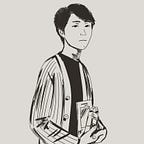The Yuha Archive :: “SONICFOLIO SCORES” Episode 3:: Garden— FIELD NOTES
SONICFOLIO SCORES was a collection of graphic scores jointly produced by The Yuha Archive (Toronto), and The Operating System Liminal Lab (New York). From August 2021- August 2022, eleven graphic scores were produced. Each graphic score endeavored to introduce new perspectives in musical notation and interpretation. The full archive can be found HERE
“Garden” is the third installment of the SONICFOLIO SCORES Project supported by the Operating System & Liminal Lab. To stay up to date with the Yuha Archive SONICFOLIO Series, follow the project on Soundcloud or the Archive’s website. For the introduction to this series here on the OS’ Medium platform, click here.
“Even in the absence of an actual object or phenomenon in a perfect, optimal condition, one can still appreciate the contrast between the perfect and the imperfect by imagining the former” Yuriko Saito
Originating from the mid-15th century, the 枯山水 karensansui (dry landscape) garden articulates temporality through its “barren” and “vacant” appearance. Such as the scroll that unfolds its seemingly empty canvas to the viewer, imagination ceases to disintegrate. Void becomes self-solicitation that neither flows nor trickles away. Sculpting space as in space through measurable transiency, allows for the viewer’s progression to hover, yet satisfies incompleteness to the beholder of its deliberate space. Space in a karensansui is layered asymmetrically — — rocks placed unevenly throughout to the incongruous pairing of trees and bushes that mitigate an experience as its own accidents. Emptiness becomes a reminded duration termed by its gravitation to its temporal particle and the object concerning the presence a given space encounters. When a scroll is unfolded, where does its mitigation through presence, and the beholder align?
The poet Alvin Wong and I composed the graphic score “Garden” which seeks inspiration from the karensansui to create a unified sound structure through the asynchronous use of text and found sounds. The text featured in the score was written by Wong and was recorded by several people throughout the world — — Hong Kong, Australia, Canada, and Poland.
To each and one’s own tempo. With each voice, becomes the fragment. With each fragment, becomes the unity. Within unity finds variety. From variety, is the sculpting of space layered endlessly. We are more than an eternal landscape together.
Soundscape design: Alinovsky
Field Recordings: Stanford Cheung
Text recordings: Sarphina Chui, Oscar Jiang, Barry Lai, Eva Skorzewskaeva, Gabriel Théberge, Alvin Wong
INSTRUCTIONS ON BUILDING GARDEN
- Find a vacant area
- Assemble as many people as you wish to read the text on the score. Remember that less is more
- The poem should be read with a sense of timelessness and space. Avoid rushing. Pause and examine the spaces between each line. Each reader should progress in their own tempo. One’s sense of time is unique.
- Record found sounds within the two kilometer radius of the area where the poem was read
- Assemble the soundscape together
Stanford Cheung engages across a variety of creative hubs as a classical pianist, sonic artist, improvisor, and multi-disciplinary poet. From concerto performances with orchestras, poetry recitals, to electronic free-form improvisation for art installations, Cheung has collaborated internationally with a variety of artists and scholars, including Morgan Fisher, Steven J Fowler, Shahzad Ismaily and Nobuo Kubota. Cheung’s commissioned projects have been exhibited or forthcoming at the 43rd Rhubarb Festival (Buddies in Bad Times), Osaka University OCCA, Edinburgh University, Christchurch University, Banff Centre for the Arts, Orpheus Institute, Kitakyushu Centre for Contemporary Arts, Tokyo Poetry Journal, among others. Presently, Cheung is pursuing his Doctoral degree in music at McGill University where his research is dedicated to the Japanese composer Ryuichi Sakamoto. He runs a multimodal soundscape project called The Yuha Archive.
You can find him here: https://stanfordcheung.com/
The Yuha Archive: archiveyuha.com
Alvin Wong is a writer embedded through themes of separation, alienation, hyperviolence, frailty and beauty. We Could be Anything, a collaborative chapbook with writer/pianist Stanford Cheung and photographer Scott Hunter, is called “a shard of apocalypse buried in the ordinary montages of suburban life, scraps of love songs set aflame by death neuroses.” by Fan Wu and “truly transcendent, visionary work in this emergency present. We Could Be Anything is lush, surrealistic and courageous.” by Marc di Saverio. Other publications can be found with poetry at Half a Grapefruit Magazine and temz review, the latter nominating the poem ‘Outage’ for the 2019 Best of the Net Poetry contest. A short story, Before Cities Come and Go has been published through Ricepaper Magazine. He was the former senior editor of Inspiritus Press that now expands to its new iteration: Andata Express a former publishing press now multi-disciplinary arts collective, the outward journey from the breath of inspiration.
Alain Lefebvre aka Alinovsky is a sound artist, record producer, and multi-instrumentalist from Belgium. Since 1976, Lefebvre has recorded and performed with American bands Tuxedomoon, Anna Domino, Winstong Tong, Blaine L. Reininger, the English musicians Vini Reilly (The Durutti Column), Anne Clark, Alan Rankine, the French band Antena and the Belgian musician Benjamin Lew among others. In 2007, Lefebvre founded his label Off which up to 2021 has released more than 400 avant-garde recording projects from all over the world.
The Label: www.off-recordlabel.blogspot.com
